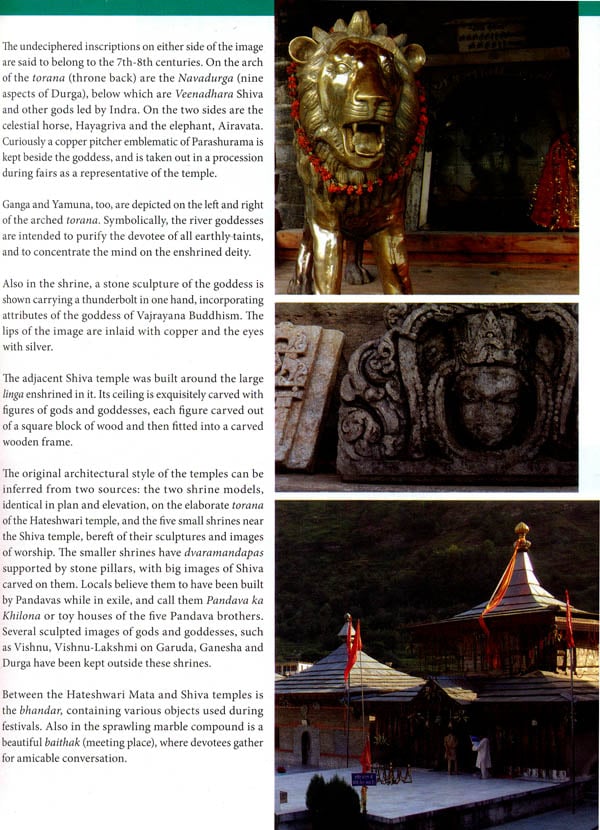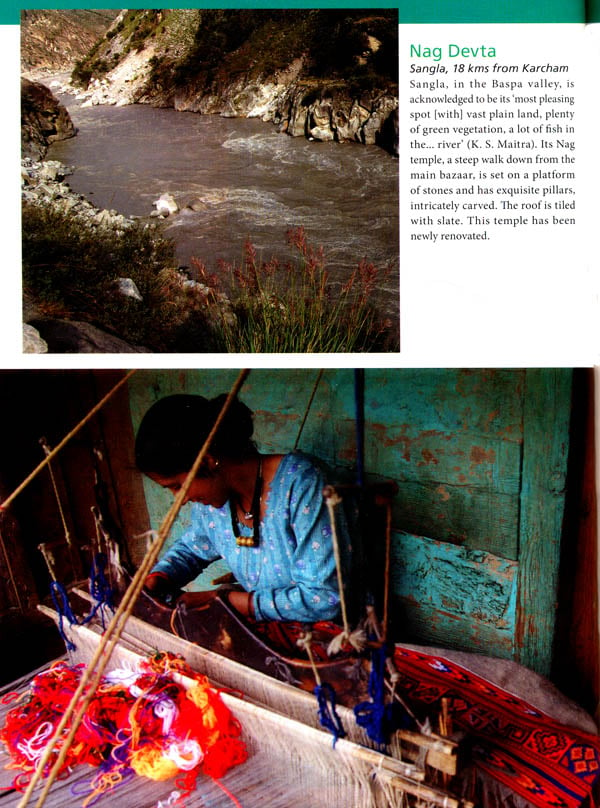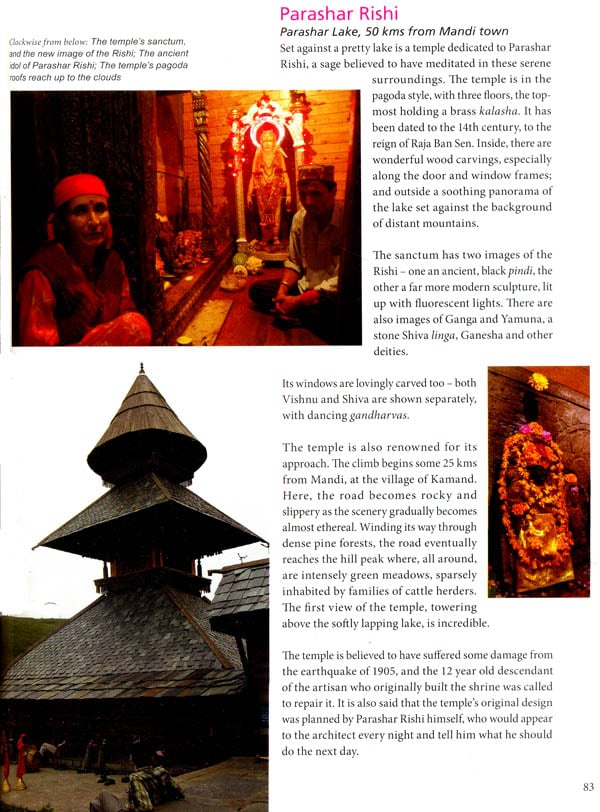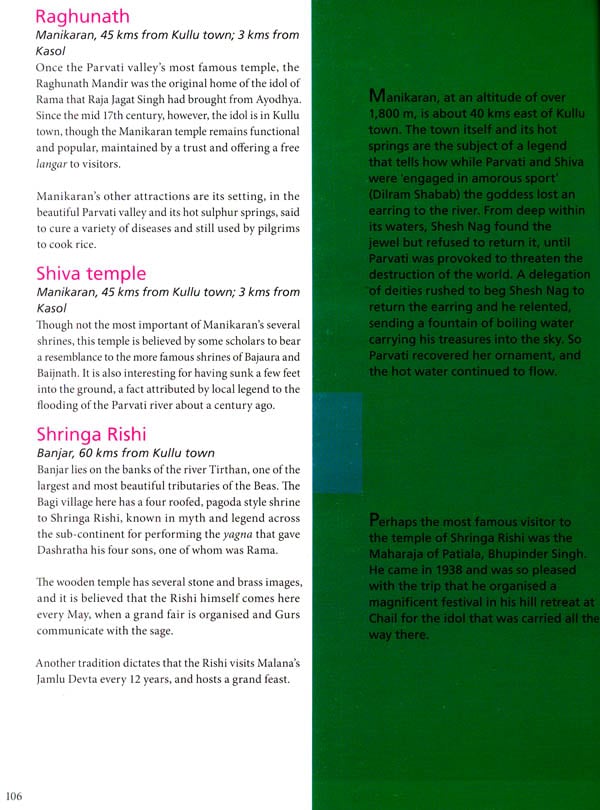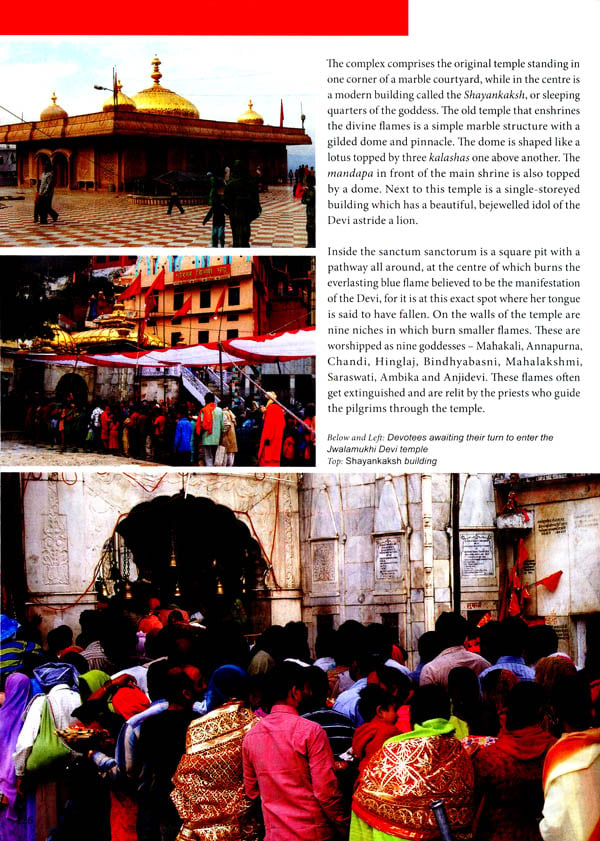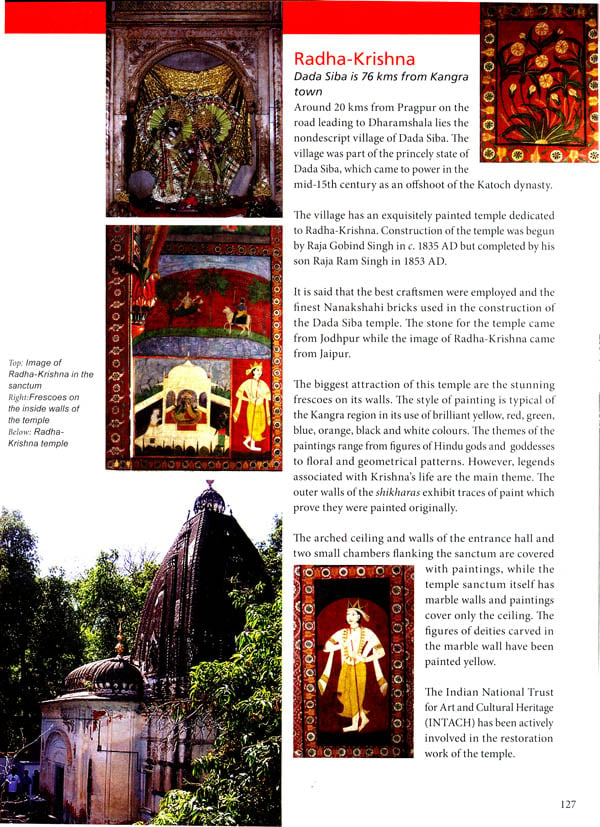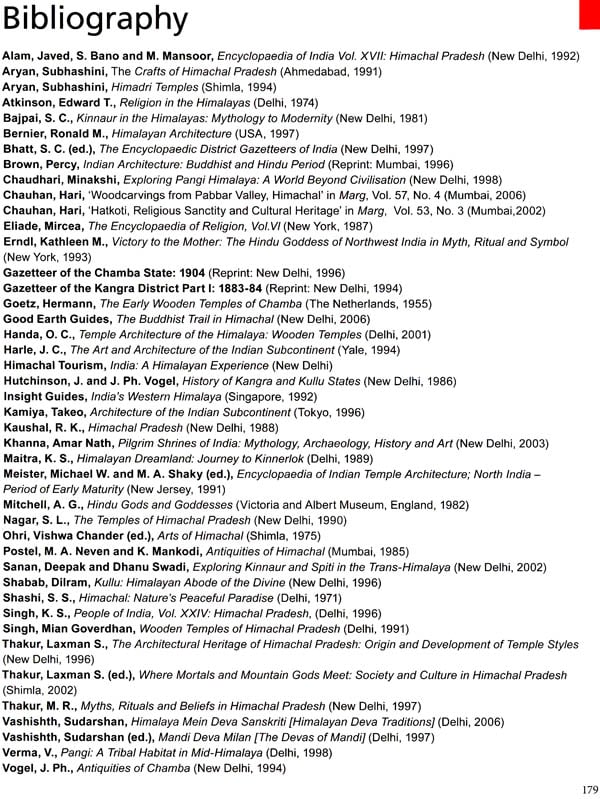
The Temples of Himachal
Book Specification
| Item Code: | NAF056 |
| Author: | Swati Mitra |
| Publisher: | Good Earth Publications, New Delhi |
| Language: | English |
| Edition: | 2007 |
| ISBN: | 9788187780403 |
| Pages: | 180 (Throughout Color Illustrations) |
| Cover: | Paperback |
| Other Details | 9.0 inch x 7.0 inch |
| Weight | 380 gm |
Book Description
There is a touch of divinity in the valleys of Himachal Pradesh, sheltered as they are by the soaring Himalaya peaks where the gods live, watered by lakes and rivers from which ancient heroes have drunk, and peopled by race that trace their lineage deep into antiquity, when spirits and men walked the earth together.
Includes
• Over 450 specially-commissioned photograph
• Detailed historical and architectural descriptions of over 110 temples: among them Jwalamukhi in Kangra, Lakshmi-Narayana in Chamba, bhimakali in Sarahan and Raghunathji in Kullu
• Maps of each district
• An extensive Bibliography and Index
This book offers a tour through rituals and sacred arts tradition – primarily as it is manifest in devagrihas and devas the architectural and sculptural arts, but also as it exists in the conventions practiced around these monuments: the music, folklore, festivals and ritual that make them living repositories of ancient practice.
With this book we hope to bring the splendid temples of the state – along with the beautiful sculpture and painting with which they are embellished and the intriguing legends that surround them – from the shelter of snow-peaked mountains into the spotlight. We hope, too, that readers will be inspired by the evocative photographs and deeply researched and informative text to visit this magnificent region, not just for its enchanting topography but also for the temples, both ancient and modern, which ared as much a part of the landscape as its blue rivers and soaring mountains.
Indeed, Himachal Pradesh is blessed with such a profusion of religious architecture that organizing this book proved as much of a challenge as gathering its content. So, to aid readers in navigating the detailed information contained within, we have provided a brief guide to the book below.
How to use this book
Since the division of Himachal Pradesh into districts is a relatively recent phenomenon, we decided to us e a more traditional organization in planning this book. Thus, the first chapter, aptly named Devas and Devagrihas introduces the reader to the gods and goddesses and their temples in this mountain land. The next chapter covers Shimla, Kinnaur, Sirmaur and Solan districts – some areas of which were in ancient times part of the Kulinda kindom. Later, for many years, much of the region was ruled by the great Bushahr dynasty. In the third chapter, we travel to Kullu and Mandi, watered by the Beas and known for the deep religionsity of its people. Temples of Kangra, Bilaspur, Hamirpur and Una districts make up the next chapter. The region largely constitutes the fertile Kangra Valley, and was historically part of the Trigarta region. Finally, we journey to the most remote valleys of Chamba and Lahaul, where wooden temples have surivived, almost miraculously, for over 1,000 years and whose people have, in their isolation, created some truly unique forms of painting and art.
Another factor in this classification has been geographical expediency. Himachal’s southern and south-eastern districts, Shimla, Kinnaur, Sirmaur and Solan, are connected by the National Highway 22, while the NH 88 runs west from Bilaspur via Hamirpur to Kangra, just touching the border of Una. Kullu and Mandi are well connected by the NH 21 and the NH 22. Chamba and LAhaul, meanwhile, are both somewhat more difficult to reach. Chamba is usually approached via Punjab (Pathankot), while Lahaul, though it has close historical ties with Chamba, is best approached on the NH 21, via Manali (Kullu); and LAhaul is the best base from which to travel to the isolated Pangi valley in Chamba district.
Within this broad classification, the temples are organized by district and alphabetically. For those interested in finding a particular temple, there is an Index on p. 178. We have also provided a district-wise list of temples on the back flap. In addition, there are maps of every district, so the location of temples may be easily determined.
Himachal Pradesh is firmly entrenched in the popular imagination as a land of high mountains and lush valleys, of deep, fast-flowing rivers and quiet hill stations, where weary travelers from the plains can find rest for both the body and the mind.
However, the state’s natural riches sometimes tend to overshadow its great aesthetic and spiritual treasures, especially its tremendous architectural heritage. Of course travelers and pilgrims are familiar with the more famous temples of Himachal Pradesh – Baijnath and Jwalamukhi of the Kangra valley are household names across India. Yet, the state’s temple architecture extends far beyond these, both in time and space. Some of Himachal’s less well known but truly remarkable shrines include: the more than 1,000 year old wooden temples of remote Chamba; the secluded Hatkoti and Bhimakali complexes, both jewels of Shimla district; the mystical Parashar lake in Mandi; the many enchanting Buddhist-cum-Hindu temples of Kinnaur; and many, many more. These are all equally part of the complex and fascinating cultural and aesthetic fabric of not just Himachal Pradesh, but all of India.
We hope that this volume on the Temples of Himachal Pradesh will give readers a glimpse into this heritage, and perhaps inspire a desire to travel to this picturesque land and learn more about its ancient traditions. Those who do will find that this new way of seeing Himachal Pradesh yields some astonishing results. They will notice how its shrines embody the deep spirituality nurtured by its mountains and rivers; and how, in fact, an understanding of the sculpture and architecture of the land only deepens the appreciation of its natural wonders.
For too long, Himachal’s artistic history has been kept separate from the immediate splendor of its landscape. This book attempts to fuse the two together, and presents the state as a true whole – as the valleys of the gods.
| Devas and Devagrihas | 4 |
| Shimla | 21 |
| Kinnaur | 48 |
| Sirmaur | 61 |
| Solan | 67 |
| Mandi | 74 |
| Kullu | 88 |
| Kangra | 114 |
| Bilaspur | 134 |
| Hamirpur | 135 |
| Una | 140 |
| Chamba | 146 |
| Lahaul | 178 |
